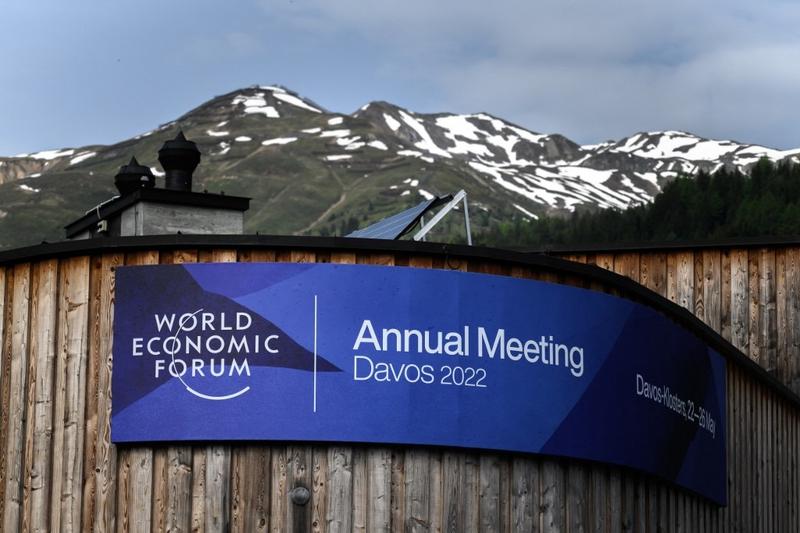 A picture shows an event banner on the congress center ahead of the World Economic Forum annual meeting in Davos on May 22, 2022. (FABRICE COFFRINI / AFP)
A picture shows an event banner on the congress center ahead of the World Economic Forum annual meeting in Davos on May 22, 2022. (FABRICE COFFRINI / AFP)
GENEVA - There is still a long way to go to reach gender parity as the global process has been delayed amid the compounding crises of pandemic disruptions and weak recovery, the World Economic Forum said Tuesday.
In its latest Global Gender Gap Report, the Geneva-based forum said it will take 132 years for women to reach gender equality, a figure slightly improved from last year. Of the 146 economies surveyed, just one in five managed to narrow the gender gap by at least 1 percent compared with the past year.
The data showed that across the 146 countries, the gender gap in health and survival has been narrowed by 95.8 percent, educational attainment by 94.4 percent, economic participation and opportunity by 60.3 percent, and political empowerment by 22 percent
"The pandemic has made a huge dent when it comes to the progress that was previously made. Even two years ago, it would have taken 100 years to reach parity," Saadia Zahidi, managing director at the WEF, told Xinhua in a virtual interview ahead of the release.
Permanent scars
Due to the socio-economic shock of COVID-19, the global gender gap had widened by a generation from 99.5 years in 2020 to 135.6 years last year.
ALSO READ: EU moves to enforce boardroom gender equality
Considering that women are more vulnerable to COVID-19-related disruptions, Zahidi described the sustained impact of the pandemic on gender equality as "permanent scarring."
"When it comes to the care infrastructure, for example, there are still parts of the world where schools have not reopened fully, or where childcare centers are no longer available or available for very limited hours. The caregiving burden that fell on women seems to have become something that continues even to this day," she said.
The WEF's annual report assesses the evolution of gender-based gaps in four areas, namely economic participation and opportunity, educational attainment, health and survival, and political empowerment.
The data showed that across the 146 countries, the gender gap in health and survival has been narrowed by 95.8 percent, educational attainment by 94.4 percent, economic participation and opportunity by 60.3 percent, and political empowerment by 22 percent.
"The current economic downturn is going to have a more negative impact for women, because women are still those that have lost out more in the labor market," Zahidi warned.
ALSO READ: Gender equality in employment to be promoted
"There are some silver linings when it comes to industry leadership in specific sectors, when it comes to women in professional and technical roles, and when it comes to university education," she said. "There the performance is still strong when it comes to closing gender gaps."
Gergraphic breakdown
The report highlighted that Iceland remains the world's most gender-equal country for the 13th consecutive year and the only one that has narrowed more than 90 percent of the gender gap, followed by Finland, Norway, New Zealand and Sweden.
Zahidi specified reasons for Iceland's success, noting, "When it comes to political empowerment, it's a country that has done extremely well, including having for a very long time women in very senior positions."
"In terms of economic participation in the workforce, they've cracked the code to make it possible for women and men to participate in nearly equal numbers," she added.
The fact that four Scandinavian countries feature in the top five reflects their "belief that human capital is the greatest asset that those economies have. They are relying more on human resources than on natural resources," Zahidi said.
Call for actions
Closing gender gaps can help drive national prosperity and the global economy, the WEF report stressed.
Therefore, given the increasingly uncertain economic outlook, Zahidi called on global leaders to unleash the creativity and dynamism of their countries' human capital to overcome the current crises and accelerate a strong recovery.
ALSO READ: Scientists make gender equality push
"We are in a moment of crisis for the global economy," which stemmed from multiple factors such as the pandemic, geopolitical tensions, as well as disruptions to global trade and supplies, she noted. "That is something that in essence can only really be solved through human creativity and collaboration."
"We have to ensure that everybody can participate and decisions are taken with the broadest base possible," she emphasized. "If we want to get back to growth, if we want to get back to productivity and dynamism, we need to ensure that there is gender parity."


